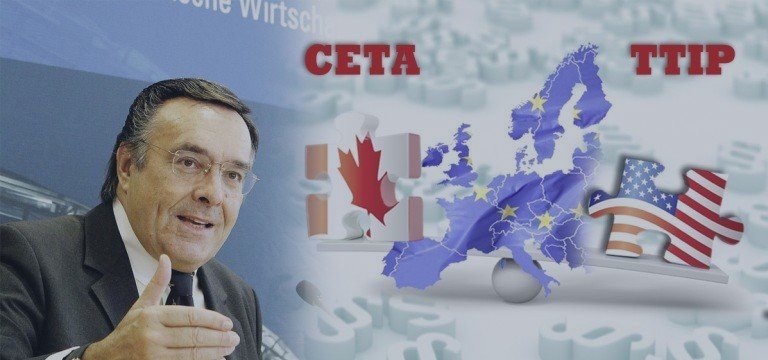
The negotiation of a transatlantic free trade agreement between Canada and the EU (CETA) and between the USA and the EU (TTIP) is being complicated by the controversial question of investment protection. With a resounding no, small business president Mario Ohoven makes his position clear in this guest editorial.
By Mario Ohoven
Pascal Lamy, General Director of the WTO until 2013, predicted a few months ago that the ongoing negotiations for the Transatlantic Trade and Investment Partnership (TTIP) would be difficult. Many open questions and differing viewpoints on subjects such as consumer protection have brought him to the conclusion that the TTIP is far more complex than a classic trade agreement.
The free trade of goods and services across national borders promotes growth and creates jobs. As an export nation, Germany has a lot to gain from trade agreements such as the TTIP or CETA, the EU’s free trade agreement with Canada. However, there are also dangers for the economy and society as a whole. Issues such as investor and consumer protection are subjects for heated debate for good reason.
Mario Ohoven, president of the German Association for Small and Medium-sized Businesses (BVMW)
I am not talking here about the much-maligned chlorine chicken, which has already been passed as fit for human consumption by nutrition experts. No, this is about diverging schools of thought on subjects like consumer protection. It is about two worlds colliding that cannot easily be reconciled: the American principle of post-purchase restitution and subsequent litigation versus the European idea of pre-purchase consumer protection.
A complete harmonization of both principles is out of the question; in many areas there is no getting around the need to deal with problems on a case-by-case basis. The real problem lies in establishing a uniformly high standard of consumer protection according to the European model that both sides can live with. This is no simple task for the negotiators. The public discussion has made one thing clear: consumers have a voice. Neither the TTIP nor CETA will make it through the various national parliaments unless the current doubts over future consumer protection standards are first put to rest.
The other major bone of contention is investment protection and the possibility that foreign investors can be hauled before the courts. This is one of the more contentious provisions in the TTIP and CETA agreements from a small and medium-sized business perspective. Those in favour like to argue on the basis of actual practice according to which Germany currently has concluded more than 130 such trade agreements with emerging and developing countries. It is here that the argument falls apart: Enshrining investor protection in the contract only makes sense in countries without an effective rule of law. In both the USA and Europe, no one could seriously claim that the rule of law does not apply. Any investor or company, be they a small or medium-sized business or a major conglomerate is free to invoke the law courts on both sides of the Atlantic. However, with an average cost of eight million USD, litigation is not really an option for small and medium-sized businesses as they run a serious risk of going bankrupt in the process. Add to that a lack of transparency and no option to appeal. From November, the new EU Commission will have to tackle the question of whether enshrining comprehensive investor protection measures in the TTIP is really a goal worth pursuing. My answer to the question would be to say no.
In conclusion, I would like to return to Pascal Lamy. He has been quoted as saying that: “Germany is like a much bigger version of Switzerland. Everything is geared up to reaching a consensus.” In relation to TTIP, we should support Federal Economy Minister Sigmar Gabriel in his efforts to obtain a broad consensus. The TTIP advisory council he has put together and populated with representatives from industry, commerce, unions, social, environmental and consumer protection associations as well as cultural representatives shows us the way forward.


